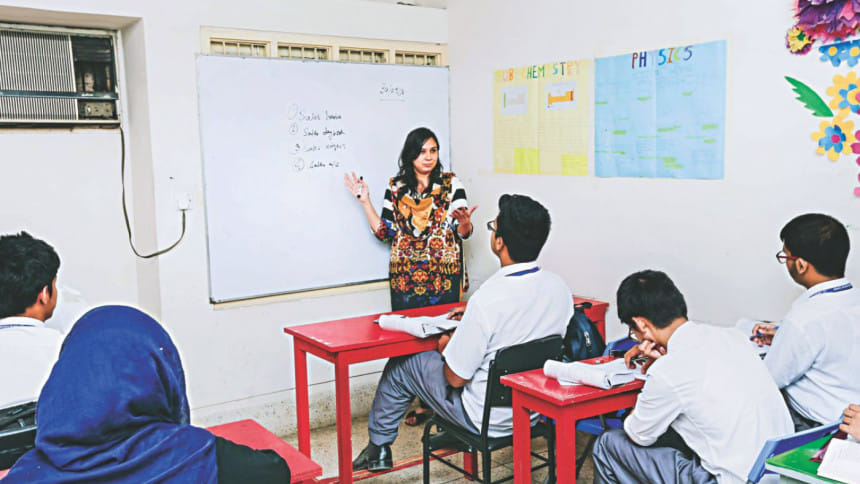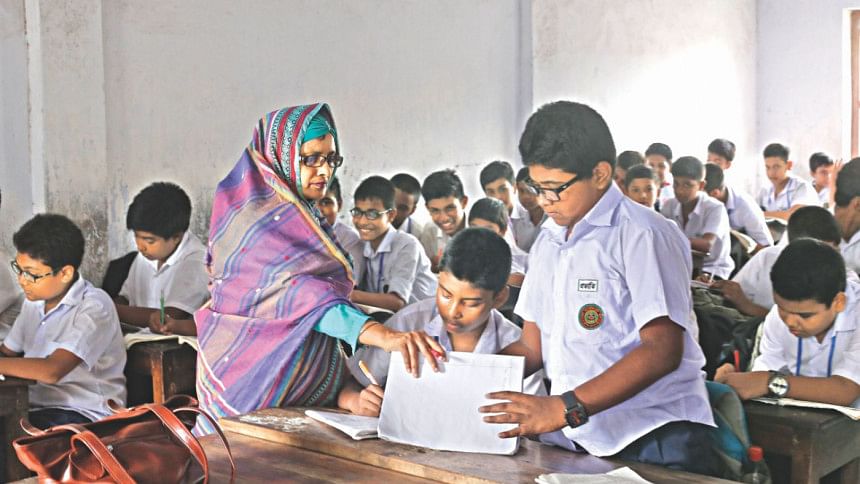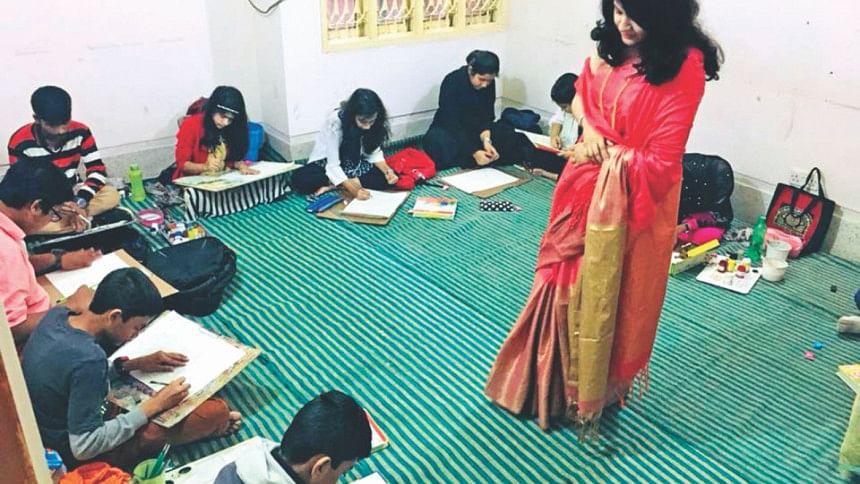What Makes an Ideal Teacher?

After parents, the only people who seem to have some of the greatest impact on our lives are teachers. A seminal study by economists Raj Chetty and John N. Friedman of Harvard University and Jonah E. Rockoff of Columbia University claims that a student with a good teacher has much more than better grades; they have greater chances of going to college, are more likely to be better off financially in terms of income and savings, might live in better neighbourhoods, and can even have greater family success.
Therefore, for Teacher's Day tomorrow on October 5, SHOUT decided to ask individuals to reflect on their school days and how their teachers impacted them so as to know what characteristics the ideal teacher should have, and what characteristics aren't helpful in creating the perfect learning environment.
Mohammad Yusuf*, a student of North South University, talks about a teacher he claims was one of the best that he had. "He explained Economics in the simplest way possible such that the information is etched into your memory. He managed to consistently make each class productive to the very end and any deviation from the course material was to tell stories that encouraged discussion and were thought provoking."

Unfortunately, this is not the case for all students as they can come across teachers whose approach causes more harm than good. Faria Jahan*, a former student of Maple Leaf International School (MLIS), says, "During my O Levels, a teacher made me lose interest in a subject entirely. As a result, I dropped the subject because I was so uninterested, even though I loved reading about it growing up."
The teacher's personality also seems to play a role in how students perform in class. Zareen Alam*, an A Level candidate, talks about a teacher she had in seventh grade who was especially harsh with her, "I was yelled at for every little mistake and was demotivated to a point where I stopped practicing maths. I felt that I was not good at maths when that wasn't really the case."
Shaheen Khan, Senior Teacher at MLIS advises teachers saying, "Be patient. Each child is unique. A child may have problems with particular subjects and us teachers can motivate them and bring out their best. We must never humiliate students for their weaknesses. Be firm if needed, but also be kind."

Things with strict teachers can get worse when with limited time and too many students, teachers end up skipping out on explaining a topic in as detailed a manner as they should.
Understanding this situation, Taher Ali, O Level Chemistry teacher at Scholastica, Mirpur Branch, says he would have "one-on-one counselling with students, discussions with parents, and extra classes" if given the time and resources.
Unfortunately, this is not the reality for many students. While students might be told that they have the option to meet a teacher personally should they need extra help, many choose to not go for it as they are often scared of the teachers and feel uncomfortable going. Tina Rahman*, a student of Independent University Bangladesh, says, "In school, there were some teachers who kept praising a handful of students and compared the rest of us to them saying we weren't as brilliant or as diligent as them. This created misgivings and made it difficult to open up or ask questions to these teachers."
However, not all students seem to be of this opinion. Yousra Ahmed*, an O Level candidate, says, "Friendly teachers are great, but their friendliness should not come at the cost of losing control over the classroom. A certain level of strictness is necessary, for some students can be really disruptive and so the students who need help suffer."

A delicate balance seems to be required when it comes to students. Abdur Raquib, senior physics teacher at MLIS says, "One of the most challenging things is to find a fine line between letting a student mature into a fully functioning person and knowing when to step in to correct them if they are on the wrong path. At times I have to relearn from the students' experiences of right and wrong."
Another peeve seemed to be teachers who consistently didn't deliver on the promises they made. Tina says, "Some teachers would say that they will give us our papers on a particular day and that they would discuss the questions but we often got our results much later, sometimes without having the paper explained."
When asked about class projects and assignments, many interesting points came up. While many loathed projects claiming they mostly cut-paste information from multiple websites, some seemed to appreciate teachers who assigned projects that allowed them to explore their creativity and were relevant and useful. Mayisha Rahman, studying at Bryn Mawr College in USA, says, "Ideally, projects should encourage students to create or build things, such as models of cell structures, so they can learn about a topic in a new way."
Sarah Ahsan*, a university student, says, "This might be an unpopular opinion but I think actually ending up doing projects does more good than harm. We sometimes have to learn how to work in a team and might have to engage in important activities like presenting or public speaking. You feel like you achieved something and it helps you overcome a lot of personal barriers."

Syeda Faiza Zaki, A Level graduate, sees projects in a new light. She says, "I gave my all when doing projects, not for grades, but because I loved it. They made me realise that this was a way of showing a teacher that I was interested in their subject even if the teacher felt that that was not so."
Seeing students beyond the marks they get and helping them with more than just getting good grades is what many students wish more teachers did. Yafa Rahman, Vice Principal, Adroit International School says, "A teacher's responsibility is to help the child grow and develop into a complete human being. We need to nurture them and care for them, helping them become good people. Besides academic skills, we should teach them empathy, compassion, generosity, sharing, and helping."
She also recalls her own school days, "Now being in this profession, when I look back, I feel there were very few teachers who inspired us – the average students. Few made us believe in ourselves. Mostly teachers focused only on the good students which only served to further hamper weak or average students. Every child has some special talent and teachers should focus on the interests and talents of each individual student."
Sarah Ahsan also mentions teachers who encouraged and enhanced her performances with their kind and caring attitudes. "I had a teacher who was strict as necessary but also respected students. I remember when during a bad time my grades were suffering, but instead of reacting to it in an angry manner, my teacher reached out and gave me guidance," she says.

Taher Ali suggests three things, "Counsel students, keep track of their emotional issues, and keep under consideration their family issues." And for fellow teachers, he has one advice: "Be honest towards your profession. If you happen to teach students out of school, do not deprive the students in the classroom. There may be many students who cannot afford to go to coaching after school."
The previous decade has brought about immense innovation in the field of education ranging from smart technology to newer learning materials, but teachers continue to play a massively important role in a student's life. The characteristics of the ideal teacher may vary according to the needs of every student. However, one thing every teacher can do for their students is appreciate them and let them know that they see their good sides too.
This is exactly what one teacher affectionately called Mrs Clarkson at Lansbury Bridge School and Sports College, in St. Helens, Merseyside, UK did when a student performed poorly in an exam. Instead of just telling the student that he needed improvement, she let him know that she realised that a test could not provide a complete evaluation of the person and went on to list the many valuable qualities he had that his test marks couldn't measure.
While we may not be able to find an ideal teacher for every student, small gestures such as writing an encouraging letter or taking the time to talk to a student can be immensely beneficial for the student, for even if the teacher isn't completely ideal, the teacher-student relationship can become an ideal one based on respect, understanding, and appreciation.
COURTESY: ADROIT INTERNATIONAL SCHOOL
*Names have been changed to protect the privacy of individuals





Comments